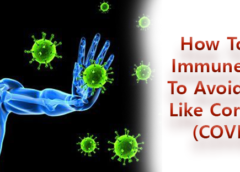Everyone has this query in their mind during this CORONA Outbreak that how we can avoid this COVID-19 and how can we boost our immune system? We don’t know yet, how to fully prevent or manage the damage caused by COVID-19, the disease caused by a coronavirus that is new to us all.
There are different-different claims about the immunity boosting with just vitamin C or Vitamin D for something else. But it all depends on your diet and food. Are you getting all required nutrition through your daily diet? But how do we know which of these recommendations, if any, really work?
Our immunity system depends on various components. Helping one section might impair another, or boosting a certain section may have nothing to do with fighting viruses.
With that in mind, here are some of our top tips to decrease your risk of catching the virus or having complications from COVID-19.
The basics Tips
- Proper Hand-Washing
- Avoid Social Gathering
- Don’t smoke
- Get adequate sleep
- The right amount of exercise
- Stress management
- If you drink alcohol, drink in moderation
Supplements that may help:
Vitamin C:
Vitamin C is known as ascorbic acid is a water-soluble nutrient found in some foods, has been used to help prevent the common cold. It acts as an antioxidant, to protect cells from the damage caused by free radicals. Vitamin C absorbs helps the immune system work properly to protect the body from disease.
While it’s not clear whether taking a Vitamin C is beneficial for COVID-19, there’s no harm in taking up to 2,000 mg per day (limit set by the National Academy of Medicine).
Read Also:Symptoms That Can Indicate, You May Have COVID-19
Vitamin D:
If your Vitamin D levels are low in your body, you may have a better chance of staying well if you supplement with 2,000 IU per day (with medical supervision). So it’s right to take a Vitamin D supplement, especially if you’re at increased risk for COVID-19. It is obvious the human body can get Vitamin D from sunlight, so try to get some sun whenever you can. How much sun depends on the time of year and your location? A good starting point is 15 minutes of exposure to a large body part (such as the torso or back).
Zinc
Zinc is an important mineral involved in the white blood cell responsible for an infection that is naturally present in some foods, added to others, and available as a dietary supplement. Very small amounts of zinc are necessary for human health.
Taking supplementary zinc may be a good strategy for older people and others at increased risk. If you decide to take zinc, make sure to stay below the upper limit of 40 mg per day and avoid administering nasally, due to the risk of olfactory complications.
Turmeric
Turmeric is a spice commonly used in Indian and Asian cuisine, including curries. It helps your body fight foreign invaders and also has a role in repairing damage and enhances immune function. Scientists now believe that chronic, low-level inflammation plays a major role in almost every chronic, Western disease. This includes heart disease, cancer, metabolic syndrome, Alzheimer’s and various degenerative conditions.
Echinacea
Echinacea is an herb that is native to areas east of the Rocky Mountains in the United States. Echinacea is most commonly used for the common cold and other infections. Commercially available echinacea products come in many forms including tablets, juice, and tea. It appears to be safe to take on a short-term basis. If you’re at high risk, you may consider taking it for the next several weeks. Echinacea seems to activate chemicals in the body that decrease inflammation, which might reduce cold and flu symptoms.
Required Nutrition
Fruits, veggies and seeds
Fruits, vegetables, and seeds are common recommendation to boost your immunity. There are various fruits and veggies such as Sunflower seeds, Kiwi, Papaya, Green tea, Turmeric, Almonds, Yogurt, Spinach, and Ginger etc. contain nutrition. Eating right is a great start, and there are other things you can do to protect you and your family from the flu, cold, and other illnesses.
Variety is the key to proper nutrition. Eating just one of these foods won’t be enough to help fight off the flu, even if you eat it constantly. Pay attention to serving sizes and recommended daily intake so that you don’t get too much of a single vitamin and too little of others.
Refined Carbs and Sugars
Sugar may impair white blood cell function, but no credible evidence shows eating it makes you get more infections. Refined carbohydrates and simple sugars are two of the biggest offenders for blood sugar spikes and therefore should probably be avoided. However, other evidence suggests acute rises in blood sugar may increase risk of infections and complications. Therefore, it would make sense that we want to limit these blood sugar elevations.
We suggest measuring your blood sugar either with a regular glucometer or, even better, with a continuous glucometer (CGM) if you have access to one. If the foods you eat cause your blood sugar to rise above 140mg/dl (7.8mmol/L), consider eating something different.
Chicken soup/bone broth
There is a kind of myth that chicken soup can treat cold and flu. But, it may not be 100% a myth. One research showed chicken soup “inhibited neutrophil migration,†could improve our ability to recover from infections.
However, this is one of those instances where laboratory findings may not translate to clinical improvements such as fewer or less serious infections. But it’s hard to argue with a tasty home-made soup with chicken, a few low-carb veggies, and plenty of real salt. Immune booster or not, it sounds like a great meal for a wintery day in self-isolation. We chalk that one up to good self-care

Leave a Reply
You must be logged in to post a comment.